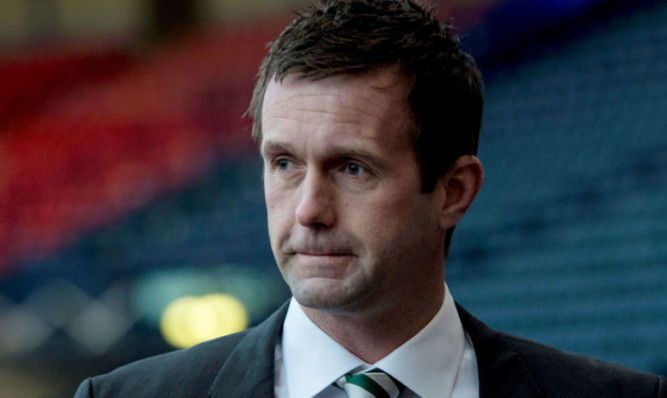
Treble Yell for Ronny.
One of SKY Sports commentators voiced an interesting thought at Firhill last Wednesday night.
Noting the enthusiasm with which Celtic boss Ronny Deila led fans in celebration of another three points, he asked: “If Ronny is going to be like this when they beat Partick Thistle, what will he do if they win the Treble?”
Given the initial shock of his appointment was eclipsed by the photos which subsequently emerged of the Norwegian stripped down to his pants after his old club Stromgodset escaped relegation, the query may not entirely have been in jest!
The way the season is unfolding, in three months’ time the answer if not Deila himself is set to be laid bare for all to see.
Impressive as it was, the 3-0 Firhill win over the Jags was not, of itself, especially significant.
Little by little, though, this group is closing in on an achievement that will be one for the ages.
Win the Treble and 39-year-old Deila will take his place in the record books alongside Jock Stein and Martin O’Neill (right) as the only Celtic managers to complete the domestic clean sweep.
They are clear at the top of the Premiership and have a League Cup Final date with Dundee United at Hampden Park next month.
They have also reached the quarter-finals of the Scottish Cup in which United again are the opponents, only this time they must travel to Tannadice.
So can they win all three competitions, while also trying to advance in Europe historically a big handicap?
The answer is yes. They now boast a superior group of players to their rivals plus an impressive sense of purpose.
Indeed, scrutiny of their task suggests that might be the wrong question.
The query instead should perhaps be why haven’t more Celtic managers succeeded?
Why, given their historical advantages, has the club won only three Trebles, when rivals Rangers have seven to their name?
Stein was the first manager in the club’s history to sweep the domestic board in 1966-67, then followed up by repeating the feat in 1969.
Yet even that failed to accurately reflect their dominance of the time.
It was to be 32 years later before they would manage the trick again, O’Neill’s team winning them all in his first season in charge.
In retrospect, that wasn’t a huge surprise.
The Irishman inherited a squad replete with talents such as Larsson, Lambert and Lubo, and was allowed to add Neil Lennon, Chris Sutton and Alan Thompson at a combined cost of just under £15-million.
What is remarkable, though, is that they didn’t do so again.
In 2003-04, still under O’Neill’s charge and a year on from their run to Seville and the UEFA Cup Final, Celtic racked up a record 25 SPL wins in a row.
Then they won the title by 17 points, with a goal difference of plus 80, won the Scottish Cup at a canter and knocked Barcelona out of the UEFA Cup.
Jackie McNamara, a key member of that side and the current Dundee United manager, has spoken of it being easier to win the Treble now than in the past.
That year it was surely harder to mess it up yet mess it up they did, losing to Hibs in the clubs’ League Cup quarter-final at Easter Road.
O’Neill, a keen student of football history, was devastated at the missed opportunity and critical on the night of John Kennedy, who had conceded a penalty.
In one of the neat storylines which football does so well, 11 years on Kennedy is part of Deila’s coaching staff pursuing a fourth Treble for the Hoops.
Likewise that Scott Brown one of the Hibs team that torpedoed the 2003-04 push is now the on-field leader of the Celtic side.
An enthusiastic advocate of the high-tempo game favoured by Deila, Brown seems genuine in his belief that the Treble can, and will, be won.
He, though, has his own cautionary tale from that 2004 about the danger of taking things for granted, when Hibs followed up their Celtic success by advancing to the League Cup Final.
Some 30,000 fans travelled to Hampden, confident of victory over Livingston, who were in administration.
What they saw was a shock 2-0 win for the underdogs.
Brown and Celtic’s recent history is also littered with examples of what can go wrong.
For all his success in his time at Celtic Park, Neil Lennon never won the League Cup.
He came very close. He lost the 2011 Final in extra time to Rangers, then reached the showpiece again the following year only to suffer a wounding loss to Kenny Shiels’ Kilmarnock.
St Mirren beat them in the 2013 semi-final. Last year it was the turn of Championship Morton to cause a shock.
As much as that last result should give inspiration to Dundee United, there is little likelihood of Celtic going into those games against in a complacent frame of mind.
Those of a nervous disposition may want to get ready to alert their eyes but the “Ronny Roar” celebrations are set to get wilder.

Enjoy the convenience of having The Sunday Post delivered as a digital ePaper straight to your smartphone, tablet or computer.
Subscribe for only £5.49 a month and enjoy all the benefits of the printed paper as a digital replica.
Subscribe